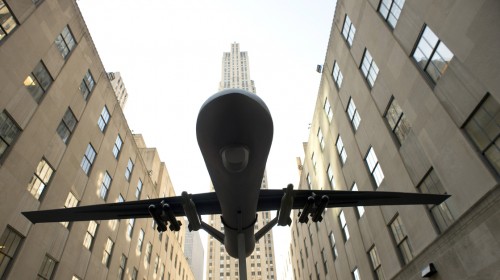
This entire process is ourselves talking to ourselves. It’s an exercise in massive, masturbatory self-analysis. And while we engage in this self-centered groping, they watch, silent and impassive. To the extent that they give us answers at all, it’s placation. They become the blankness to which we attach anything. They are not self-defining. They allow us that control, a consensual kind of tyranny, a sado-masochistic power exchange. They understand that much. They know what we need to believe. They know what we need.
June is the month of drones, as Adam Rothstein and Olivia Rosane of The State present Murmuration, a festival of drone culture. I’m excited about this – no big surprise there – and given that I’ve been writing for it a bit, I’ve been returning to some of the other things that have been written before now on the subject of drones, and what drones are, and what we are to drones and vice versa, and what difference it all makes anyway.
Rothstein and Rosane have both called for more drone fiction, for fiction as a means by which to approach the complex and slippery semi-fictional liminality of drones. I’ve echoed that call. Fiction doesn’t mean untrue; sometimes fiction is the only tool we have with which to approach any kind of truth at all, for a given value of true. And we’re at a point in our cultural trajectory where drone fiction is necessary.
So I’ve been writing drone fiction. This exercise has taken the form of three pieces, one of which has been shelved and the other two of which are in front of various people now. The two pieces I’ve left on the table have ended up being sibling pieces, despite the fact that I didn’t intend to write more than one piece at all. And it’s been interesting watching what elements have emerged as the focus. In retrospect none of it surprises me, though I probably wouldn’t have predicted it prior to writing. Creative writing is like that; it can be a kind of Rorschach test, a place where the subconscious emerges in front of you. So these are the things I care about. This is what I really want, this is what scares me.
When I wrote my expanded call for drone fiction, I listed three possible elements on which to focus: the casualties, the operators, and the drones themselves. I thought the first two would be the most obvious and probably the most approachable, but the third possibility interested me the most, partly because it seemed to me to be the most difficult. What’s involved in making a drone a character? Can it be done without anthropomorphization? Should it be done that way? What happens when it’s not?
Fighting with a drone is like fucking a drone in reverse. It’s all me. The drone just dodges, occasionally catches projectiles at an angle that bounces them back at me, and this might amount to throwing. All drones carry two AGM-114 Hellfire missiles, neatly resized as needed, because all drones are collections of every assumption we’ve ever made about them, but a drone has never fired a missile at anyone they were fucking.
What’s emerged over and over – what I didn’t expect to emerge, and what I’ll be interested to see if it appears in the work of others – is emotion. Emotion as a central component of humanity, of human connection, and of how connection works when emotion may not be present, or may be unrecognizable. What’s emotion to machines? We’ve always held them to that standard, made emotion the Turing Test against which they’re measured, and it’s a test we always load in our favor. So what happens when the power dynamic shifts, and a machine no longer tries to be a Good Robot? What happens when it’s just us, neurotic and twitchy and in a panicked kind of denial, insisting that everything not only be under our control but already is?
In what I’ve written – which I hope will shortly be available to read in full in a couple of different venues – drones are ever-present, both violent and watchful, silent observers to which humans are constantly reaching out, desperate to connect. We imbue them with emotions that they may or may not have or regard as important; we have sexual intercourse with them in the hopes of forging a deeper kind of relationship. A consistent theme here is need – needing what we’ve made, needing it to need us. In as much as human operators are even recognized to exist, they fade into the background or vanish entirely. There’s just us and the drones.
Need is by definition a loss of power. And in as much as a drone is a cultural node, it’s a node of political and social power, equally capable of surveillance and lethality, technically exact but inscrutable. A shifting, endlessly accommodating idea isn’t especially trustworthy. But maybe we want to trust. Above all, we want everything to be recognizable. We want to be able to understand.
What I think may be most terrifying about drones – at least to me – is the prospect that they might ultimately be beyond understanding. But we’ll see what Murmuration can do.
This post has been purely self-focused; after the festival has concluded I’ll post a kind of retrospective on what other themes have emerged and what conclusions we appear to have come to, if any.
(And if you have something you’d like to send in for possible inclusion in Murmuration, you can do so here.)
Sarah engages in desperate emotional connection on Twitter – @dynamicsymmetry

Comments 1
Cross Frontiers, Fly Away: A Murmuration retrospective » Cyborgology — July 4, 2013
[...] the end of my pre-Murmuration post – which identified emotion as my own dominant theme – I mentioned emotion as an entree [...]